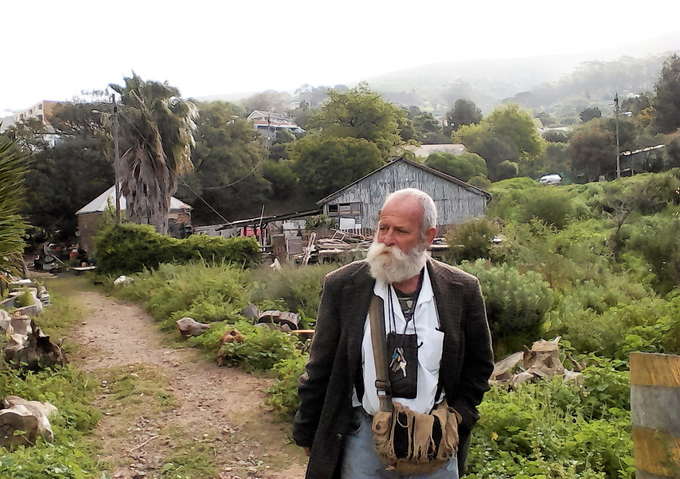
André Laubscher of ERF 81, who acts as caretaker, touring the property. Photo: Diana Mellow
7 September 2016
The residents of a community farm and “eco-village” that has been operating for 21 years in the Cape Town neighbourhood of Tamboerskloof on the slopes of Signal Hill are facing imminent eviction.
Returning from a meeting with legal advisers, the farm’s caretaker and overseer André Laubscher, enters a goat pen and opens a satchel slung over his shoulder.
“Meet the new residents of the farm,” he says to his daughter. In the bag are two chicks chirping for water. After feeding them, he tucks the birds away and follows her to a fire pit, where three young residents — also facing eviction — are sitting after returning from the same meeting.
The 8.4 hectare farm, officially listed as ERF 81, is on land managed by the Department of Public Works. The land once housed military barracks, which have been turned into informal homes. There are also vegetable gardens, nurseries, chicken coops, and grazing areas for goats and ponies. The land is home to 30 full-time residents, many of whom came to the farm as a last resort.
At the end of July, the Department of Public Works gave residents one month to leave the property. The businesses on the farm were told they had to vacate the property by Wednesday, 31 August. But the residents say that so far they have not heard from the police or city officials. An online petition to stop the eviction has gathered over 1,900 signatures.
Thami Mchunu, spokesperson for the Department of Public Works, said the department was aware of the petition and planned to hand the property back to the Department of Defence.
But the residents of ERF 81 said they were hoping for a lease from the Department of Public Works for one year to attract investments and donations. The department has said it is unwilling to grant the one-year lease.
Mzukisi Zele, a resident involved in the legal proceedings, said: “We agreed that we will continue regardless.”
Laubscher said he believed there was an important role for the farm in Cape Town in building a community.
“I strongly feel that the right thing should be happening, should be supported,” he said. “I know we need housing in Cape Town; it’s a serious issue. But we also need the things happening on the farm.”
Planting a seed, attracting investors
Chuma Mgcoyi, who has lived on the farm for three years, said she moved there because she could not afford the rents in Observatory. She and five other young Capetonians have since founded Tyisa Nabanye, an urban gardening collective that grows organic food on the property and hosts weekly farmers’ markets.
Unathi Dyantyi, one of the project’s co-founders, said the threat of eviction had made it difficult for Tyisa Nabanye to attract investors and donors. “People don’t want to invest if they don’t know if tomorrow we’re going to be evicted.”
Zele, also a co-founder, said he felt the government should appreciate the gardening collective for its promotion of social cohesion and hands-on, community-based work.
“The government should look at us and support us because this is the kind of youth they want in this country, youth that created something out of nothing,” he said. “We are the state.”
‘This is my home, my everything’
The ERF 81 farm was a foster home for three years, and since then, has become known as a safe haven for children and a place to interact with farm animals, said Illiona Morris, Laubscher’s daughter. She said the first foster child was now 20 years old and beginning his university studies.
Fourteen-year-old Thimna Jack has lived on the farm since age two. She said she saw Laubscher as a father figure, someone to go to for advice and support. Her mother lives in Khayelitsha, but the two did not see each other often, she said.
“I wouldn’t be where I am if it wasn’t for [André],” she said. “This is my home, my everything.”
ERF 81 also engages with the Tamboerskloof and Bo Kaap neighbourhoods nearby. The land is open to the public. After school, local parents such as Candice Kotze, who said she has been taking her son to the farm several times a week for the past four years, often bring their children to climb the trees that ring the property and play with the animals.
Laubscher said he wants the farm to have an educational aspect for children raised in urban environments.
“If you grow up on a farm, there’s enough media to make you know you want to be a doctor,” he said. “But for a city kid?”
“It’s priceless,” interrupted a mother who had brought her children to play at the farm.